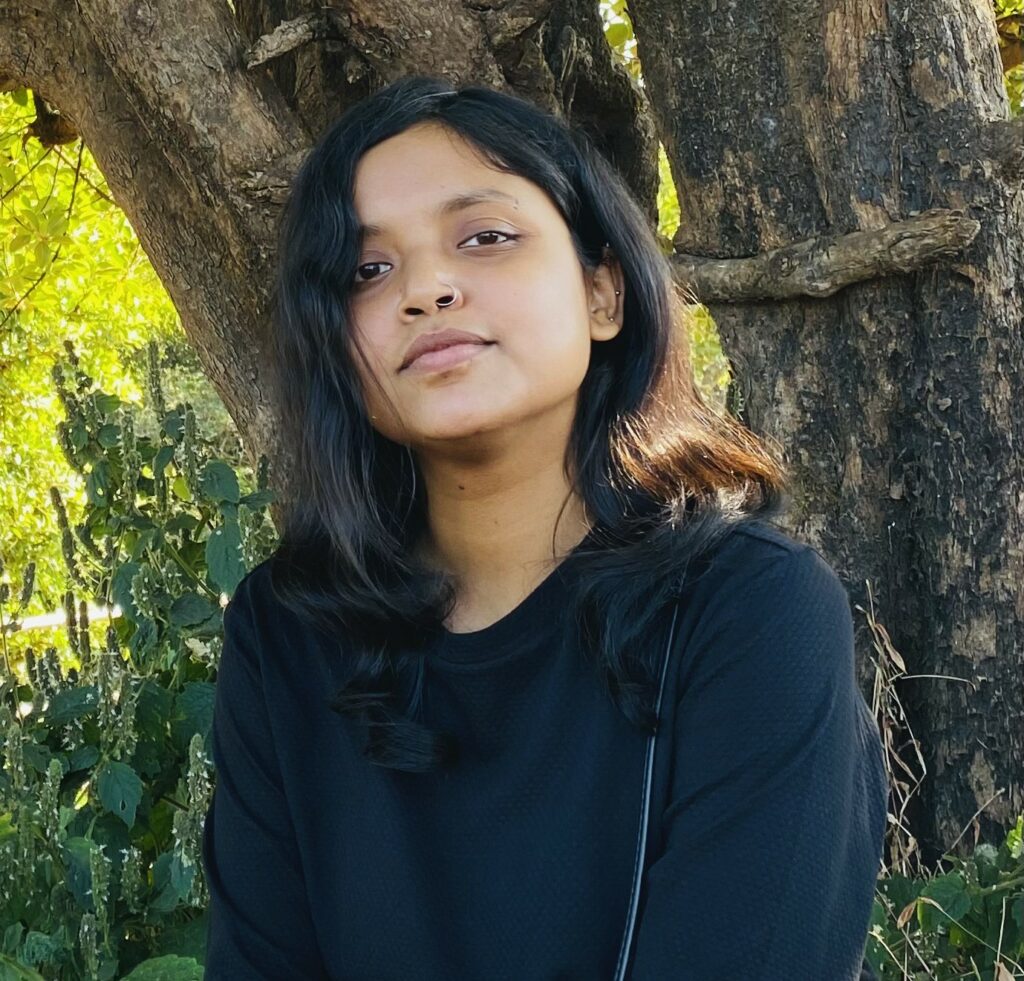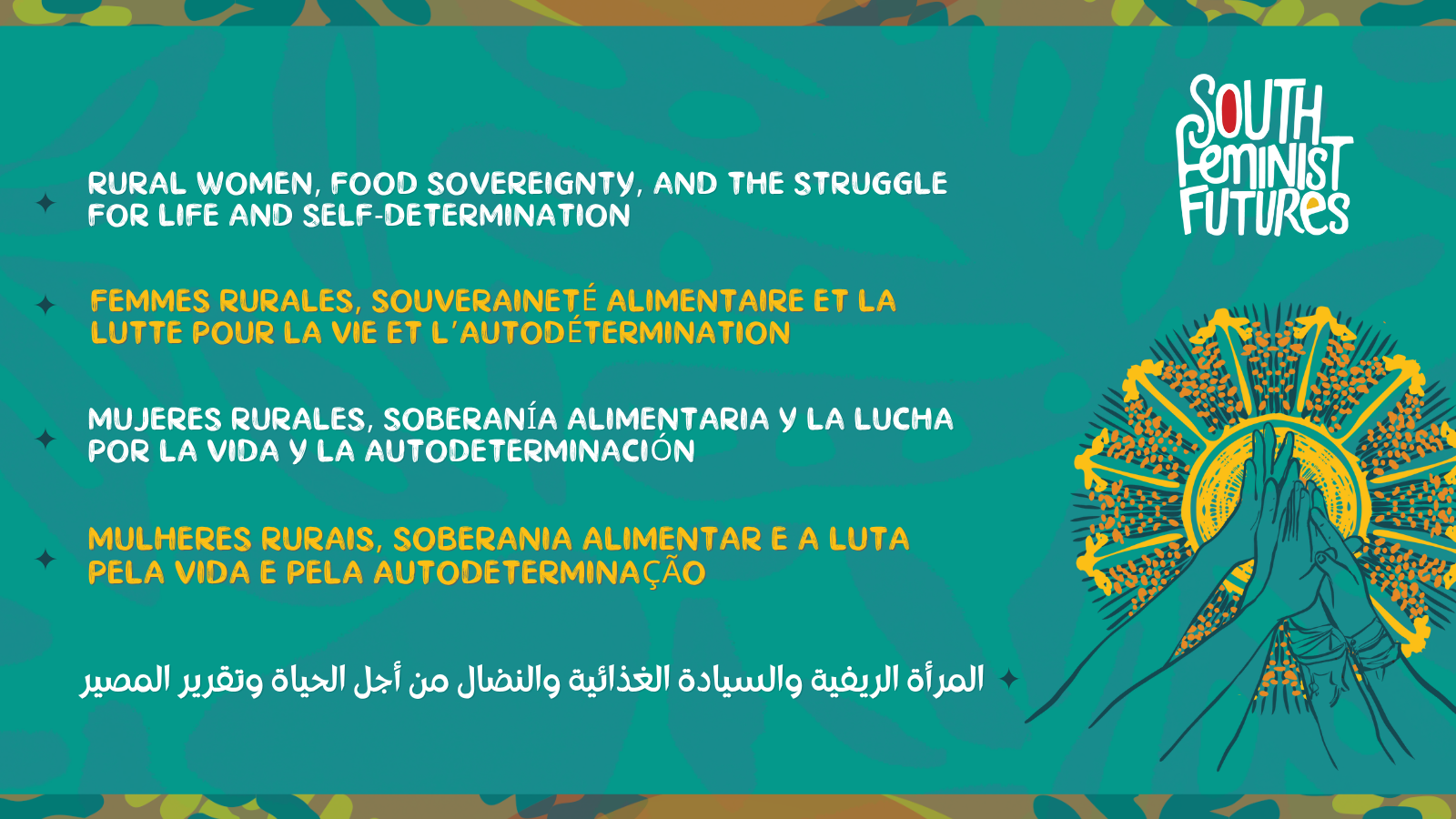At South Feminist Futures, we celebrate the International Rural Women’s Day as a moment to recognise and reflect on the political, ecological, and social actions of rural, peasant, and Indigenous women – central agents of self-determination who sustain and defend land, food, and the commons, and who create and uphold antipatriarchal, antiracist, and anticapitalist ways of living. (1)
First recognised by the UN in 1995 to highlight the role of rural women in agriculture, food security, and poverty reduction, International Rural Women’s Day serves as a reminder that rural, peasant, Indigenous and women’s movements have long expanded these frames, locating women as protagonists in the struggle for sovereignty and justice.
Key milestones in this struggle include La Vía Campesina’s Declaration at the 1996 World Food Summit in Rome, where the movement first articulated its vision of Food Sovereignty, explicitly recognising women as political agents within it — a recognition later echoed in the Summit’s Final Declaration – 1996 Rome Declaration on World Food Security. (2) The 2007 Nyéléni Declaration situates women as key actors in agrarian justice and food sovereignty, recognising them as historical (but devalued) creators of knowledge about food and agriculture. (3) It emphasises the need for “genuine and integral agrarian reform…that revitalises interdependence between producers and consumers, ensures community survival, social and economic justice, and ecological sustainability, with respect for local autonomy and governance with equal rights for women and men, guaranteeing the right to territory and self-determination for our people.”
Rural, Peasant and Indigenous women: food, care and self-determination
The labour of rural, peasant and Indigenous women in the social organisation of care, food production, cultivation, and ecosystem management is vital to sustaining food systems, communities and households, and asserting self-determination over life and territory. Yet this labour has been persistently invisibilised and dismissed. As Lyn Ossome writes, “The history of women-led agrarian struggles in Africa tells the story of women’s opposition to their dispossession from the life-centered resources on which they depend for the sustenance and reproduction of their family, kin, and communities.” (4) She reminds us that women’s labour is both “productive and reproductive”, forming the foundation of agroecological practices, seed-saving, and sustainable livelihoods that movements for food sovereignty seek to protect, not only as a means of survival, but as an act of reclaiming autonomy over land, food, and life-sustaining resources.
As Andrea Santos Baca emphasises, food sovereignty as a feminist struggle challenges the colonial legacies, corporate monopolies, and extractive agricultural systems that have commodified food and nature. (5) By centering rural women’s knowledge and leadership, food sovereignty becomes not just a framework for sustainability, but a living practice of self-determination, reclaiming governance over the systems that sustain communities.
“Feminists have impressively accumulated, documented, and demonstrated that food sovereignty and alternative practices to capitalist agriculture – what we now call agroecology – are, in fact, practices that have long existed among rural women, though they have remained largely invisible. It is not simply that agroecology or food sovereignty includes women; rather, it is the very practices and knowledge of women that give meaning and substance to these alternatives.”
Rural, peasant and Indigenous women have long defended the “body-territory” – the intimate and inseparable connection between their bodies, land, and the communities they sustain (6): it involves a cosmogonic and political interpretation of how bodies relate to being and existing in the network of life, while allowing us to reflect on multiple forms of capitalist, racist, patriarchal and colonial oppression. (7)
However globally, women own only a fraction of land despite producing most of the world’s food. (8) In Central, East, and South Asia, just 10.9% of owners of agricultural land are women; in the Pacific, the figure is 9.6%, in Latin American and the Caribbean 17.8 % ; in Africa 20.3%. Their absence in governance and decision-making structures – combined with the disproportionate impacts of extractivism, climate crisis, and poverty that they face – reveals how denial of land and voice is a denial of self-determination itself. (9)
There is an interconnection between the issues and struggles that affect women’s and transfeminist lives and issues surrounding the defense of territory and food sovereignty: “All dimensions are interrelated. That is, violence has to do with extractivism; the places where there is, for example, mining, extractivism deepens violence, cruelty, and so on…” – Adriana Guzmán. (10) These types of activism are intertwined with popular, Indigenous, peasant, workers’ struggles.
“It is not one issue or the other: the struggle for the land, the struggle for education, the struggle for health, they are territorial struggles.”– Givania Da Silva. (11)
Dzodzi Tsikata reminds us that a feminist political economy approach to agrarian justice must ask (12):
- Who owns what? Land, water, and seeds remain concentrated in male-dominated, corporate, and colonial hands.
- Who does what? Women do both productive and reproductive labour, sustaining economies and ecologies.
- Who gets what? Women remain excluded from wealth and resources.
- What do they do with created wealth? Power and ideology reproduce inequities and dependency.
Centering women’s labour and governance transforms food sovereignty from a question of food security into a political struggle for autonomy and justice.
As Sirisha Naidu and Lyn Ossome write, “Even when gender is accounted for (normatively through guarantees of women’s rights to land), this incorporation cannot proceed in isolation from the conditions of the global economy…The failure to address the question of reproductive labour…renders land reforms as incomplete. Ultimately, there is a need to address the question of social reproduction.” (13)
Self-determination, therefore, is not simply about formal rights to land but about the ability to govern all dimensions of life-sustaining work – productive, reproductive, and ecological–beyond the constraints of extractive markets and patriarchal hierarchies.
Occupation, genocide and the politics of food
The occupation of Palestine and the two year genocide in Gaza have dramatically and tragically the political dimensions of food sovereignty. Palestinians’ right to cultivate their land, fish in their waters, and manage their food and water systems is systematically violated. Israel’s destruction of farmland, fisheries, and agroinfrastructures under blockade is not just a humanitarian crisis but an assault on self-determination (14), where hunger is weaponised as a colonial tool of domination. (15)
Defending food sovereignty in Gaza is thus, not just about access to food – it is a struggle for life, dignity, and freedom. Women, as custodians of life systems and community resilience, resist occupation, corporate and military control, and reassert the right to govern land, bodies, and resources. These struggles echo across the South – from the Andes to the Sahel, from the Amazon to Palestine, affirming that the fight for food sovereignty is inseparable from the fight for liberation.
Climate justice and land-based feminist struggles of the South
Farhana Sultana’s concept of climate coloniality shows how land grabs, monoculture plantations, extractive industries, and neoliberal “green revolutions”, exacerbate inequalities among rural women and communities, stripping them of control over ecosystems and eroding their capacity for self-determined forms of agriculture. (16) Such policies perpetuate colonial hierarchies under the guise of sustainability, disconnecting people from land, seeds, and local knowledge systems. An anti-colonial or careful climate revolution, then, demands reclaiming agency and autonomy – dismantling the colonial matrix of power.
Centering women in decision-making is essential for anti-colonial, equitable climate and agrarian policies. As Claudia Korol notes, “The defense of life and the earth – the care of seeds, and the confrontation with extractive policies – are crucial for feminists across regions.” (17)
Across the Global South, rural, peasant, and Indigenous women have led resistance movements that connect climate, land, and food struggles. Archana Prasad reminds us: “The agrarian question…is gendered and articulated in the language of the oppressed… women’s participation and leadership have considerably influenced the agenda of progressive peasant movements…Yet the emancipatory project remains incomplete because its realization depends on imagining a non-capitalist society that socializes social reproduction as an essential element of the gendered agrarian question.” (18)
Through their leadership, rural, peasant, and Indigenous women challenge patriarchy, corporate power, and colonial extraction, advancing governance models rooted in community care, sustainability, and self-determination. While frameworks like the Nyéléni Declaration, the UN Declaration on the Rights of Peasants (19), and the UN Declaration on the Rights of Indigenous Peoples (20), recognise these contributions, deep structural inequalities persist.
Conclusion
On this International Rural Women’s Day, we honour and remember the leadership of rural, peasant, and Indigenous women who defend life, land, and self-determination against intertwined systems of colonialism, patriarchy, and capitalism. We honour their knowledge, labour, and resistance that helps us reimagine food sovereignty as a transformative feminist struggle, one that sustains not only bodies and communities but the very possibility of collective freedom.
Check out our curated reading list containing resources on rural, peasant and Indigenous women’s struggles for land, food sovereignty, self-determination, and resistance against dispossession and oppression.
Written by Agustina Calcagno and Debarati Das, SFF Knowledge Base team
References:
- AWID. (2025). Reclaiming the commons. Association for Women’s Rights in Development.
- Declaration of La Via Campesina in the 1996 World Food Summit in Rome about their vision of Food Security (1996), Rome Declaration on World Food Security (1996, 13-17 November), Nyéléni. (2007, February 27).
- Declaration of Nyéléni. Forum for Food Sovereignty. There are also other international recognised declarations that highlight women’s role such as the Women’s Declaration on Food Sovereignty (2007, March 2) ,the Final Declaration of the World Forum on Food Sovereignty (2001, September 3-7), etc.
- Chachra, S., Chambati, W., Jha, P., Mazwi, F., Ossome, L., Prasad, A., Rosa, M., Shivji, I., Tsikata, D., & Yeros, P. (Eds.). (2025). Revolution and Liberation: Struggles of Working People Today. Agrarian South Network.
- Santos Baca, A. (2023, January 27). What is ecofeminism? South Feminist Futures.
- Guzmán Arroyo, A. (2024, August 20). Teach-In 15: Anti-Patriarchal Community Feminism. South Feminist Futures.
- Cabnal, L (2016) in Biodiversidad en América Latina y el Caribe. From Oppressions to Emancipations: Indigenous Women Defending Territory, Body, and Land.
- Campos, A. (2015). Gender and land statistics. Food and Agriculture Organization of the United Nations.
- Ulloa, A. (2023, August 20). Extractivismos y desigualdades de género. Voces en el Fénix.
- South Feminist Futures Interview with Adriana Guzmán, 2022
- South Feminist Futures Interview with Givania Da Silva, 2022
- Tsikata, D. (2023). What is agrarian justice? South Feminist Futures.
- Chachra, S., Chambati, W., Jha, P., Mazwi, F., Ossome, L., Prasad, A., Rosa, M., Shivji, I., Tsikata, D., & Yeros, P. (Eds.). (2025). Revolution and Liberation: Struggles of Working People Today. Agrarian South Network.
- United Nations. (n.d.). Right of self-determination of the Palestinian people. United Nations.
- Tramel, S. F., & Groten, A. (2025). Resisting forced starvation and territory grabs through food sovereignty efforts in Gaza. Third World Quarterly, 46(10), 2552912.
- Sultana, F. (2023). What is climate coloniality? South Feminist Futures.
- Korol, C. (2016, December 5). Somos tierra, semilla, rebeldía: Mujeres, tierra y territorios en América Latina. GRAIN.
- Chachra, S., Chambati, W., Jha, P., Mazwi, F., Ossome, L., Prasad, A., Rosa, M., Shivji, I., Tsikata, D., & Yeros, P. (Eds.). (2025). Revolution and Liberation: Struggles of Working People Today. Agrarian South Network.
- United Nations General Assembly. (2018). United Nations Declaration on the Rights of Peasants and Other People Working in Rural Areas. (A/RES/73/165).
- United Nations General Assembly. (2007). United Nations Declaration on the Rights of Indigenous Peoples (A/RES/61/295).

Agustina Calcagno (she/her) is an Argentinian feminist activist for social change and climate justice active in her country’s feminist movement. Her history of engagement in research and social projects related to technology, popular education, gender and environmental issues, specifically with Global South social movements, networks, NGOs and peasant and indigenous communities in Latin America is complemented by a political science degree from the Universidad de Buenos Aires (UBA), and a master’s degree in strategies and technologies for development from Universidad Complutense Madrid. In addition to her role at SFF, she facilitates and accompanies women environmental defenders in the Gran Chaco Argentino region in their campaigns and is a member of the Gender Committee of Argentina’s Land National Engagement Strategy. Agustina is also a trainer at the Latin American School for Climate Action. She is motivated by her belief in the potential and power of organised, intergenerational, intercultural South Feminists working in solidarity to tackle capitalism and gain and maintain liberation that is sustainable and in harmony with nature.

Debarati Das (they/them) is a queer non-binary feminist based in India. As the Knowledge and Research Programme Assistant at South Feminist Futures, they work to build, enhance, and sustain the Knowledge Hub to support Southern feminist activism. Their work has primarily centered women, queer and trans persons, and disabled individuals’ experiences of online harms and freedoms. Their interest lies in reimagining digital worlds through anti-colonial, feminist and queer lenses, where technology becomes a site of resistance, solidarity, creativity, and collective transformation. They’re curious about infrastructures of memory: how technologies, archives, and epistemologies shape what is remembered, who is heard, and whose knowledge counts. Currently, they’re an independent consultant also working in the areas of technology research and anti-colonial tech.
